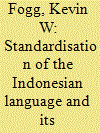|
|
|
Sort Order |
|
|
|
Items / Page
|
|
|
|
|
|
|
| Srl | Item |
| 1 |
ID:
168775


|
|
|
|
|
| Summary/Abstract |
Islamic socialism was a major intellectual and political movement in Indonesia in the twentieth century, with ongoing influences until today. However, this movement did not follow the most common narratives of Indonesian intellectual history, which trace religious influences to the Middle East and political movements to anti-colonial reaction in terms framed by the Dutch. Rather, the first major Indonesian proponent of Islamic socialism, H. O. S. Tjokroaminoto, took his thinking on Islamic socialism directly from the English-language work of a South Asian itinerant scholar, Mushir Hosein Kidwai, in a process that most likely had the minority Ahmadiyyah community as intermediaries. Future Islamic socialist thought, much of it influenced by Tjokroaminoto, continued to echo through Indonesian secular nationalism, political Islam, and even Islamism. Studying the intellectual origins of Islamic socialism in Indonesia, then, shows not only the roots of an important strand of Southeast Asian politics in the last century, but also the importance of alternative currents of thought (South Asian, outside the mainstream, Anglophone) in Southeast Asian Islam.
|
|
|
|
|
|
|
|
|
|
|
|
|
|
|
|
| 2 |
ID:
139605


|
|
|
|
|
| Summary/Abstract |
In the 1940s and 1950s, several organs of the newly independent Indonesian state oversaw the standardisation of the Indonesian national language. In this process, Western-oriented bureaucrats pushed the language towards European normativity, significantly decreasing the influence of Arabic. While this reform carried symbolic meaning, the practical ramifications on Indonesian orthography, spelling, and word selection also carried real, non-symbolic effects on the accessibility of this language to Indonesian Islamic leaders. Standardising orthography to use the Roman alphabet rendered many Muslims illiterate in a language they had been using for decades. Choices in word selection and spelling limited the Islamic meanings that the new language could carry, thus impacting how Muslims could use the national language for religious and other purposes. Indonesian linguistic reform carried serious social and political consequences in addition to the symbolic meanings often studied.
|
|
|
|
|
|
|
|
|
|
|
|
|
|
|
|
|
|
|
|
|